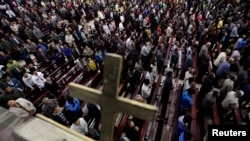Despite its tight controls over religion, and ongoing crackdowns in predominantly Muslim Xinjiang and on Christians in the eastern province of Zhejiang, China’s staunchly atheist Communist Party appears to be struggling to find ways to strengthen its grip on religion as the number of believers grows.
At a rare, high-level meeting on religion late last week, Chinese President Xi Jinping talked about the “special importance” of religious affairs and how authorities should guide believers to love their country, people and support the Communist Party leadership.
Overseas infiltration
Xi also warned the party to guard against overseas infiltrations of religion and what he called the “ideological infringement by extremists.”
According to the state-run Xinhua news agency Xi also said, “in no way should religions interfere with government administration, judiciary or education.”
Six of the country’s seven Politburo Standing Committee members, a powerful political decision making body, attended the meeting, which also stressed the importance of religious freedom and rule of law. But given the party’s tight restrictions in Xinjiang, where authorities have banned overt religious displays such as beards and veils, and Zhejiang, where authorities have been removing crosses from churches, the speech was more a source of concern than assurance for some.
Empty talk
“China’s constitution has long guaranteed freedom of religion, but that is something that has been difficult to realize, true religious freedom,” said Su Tianfu, pastor and leader of the Huoshi Church. “While [officials] talked about religious freedom at the meeting, it is something that we still find hard to be optimistic about.”
What some are looking for is more clarity and less ambiguous talk about ideology.
“There are too few specifics in what was said... there are so many house churches across the country, can you at least answer one simple question: can the churches register? Everything else, all this talk about Marxism and religion and socialism is just empty talk,” said lawyer Li Guisheng.
“A few years ago there was a draft law for religion that I had seen a copy of and it included registration for house churches. If something like that was able to move on to the National People’s Congress for review that would be something that is more concrete,” Li said.
Religious law
Analysts said that without a law for religion, authorities lack a legal foundation to handle religious affairs, including the registration of house churches. In addition, there are a slew of rules announced by more than 30 provincial and city government offices that govern religious affairs, as well as regulations put forward by the State Council in 2004. But all of the rules, analysts said, only justify the rule of the party, not rule of law, a principle that Xi Jinping has advocated since coming to office.
China’s first draft religious law was put forward by Liu Peng, a researcher with the government research body, the Chinese Academy of Social Sciences, and it is seen by some as a possible blueprint for the National People’s Congress, the country’s top law-making body.
While some argue a religious law could be used by authorities to legitimize the tight control of religious groups, Yang Fenggang, a sociology professor at Purdue University said without a law, Chinese authorities are freer to exert their own personal will in handling religious issues.
Out of touch
The comments at the conference were not entirely new, analysts said. Some remarks such as the warning about foreign infiltration have been around for decades. Much of the language was more from the Cultural Revolution era, highlighting how out of touch the party is, Yang said.
Now, he said, people have more social space for religion and there is increasingly more demand for religion.
“Society, the market economy, the current status of society makes it very difficult to have total control over religion,” Yang said.
Estimates for the Christian population range from around 60 to 100 million and that number is said to be growing each year. Some even predict it could eventually overtake the number of Christians in the United States. Followers of Buddhism are around 200 million and China is said to be home to more than 20 million Muslims.
Small victory?
China’s Communist Party has long seen religion as a possible threat to its leadership, and it is likely concern is growing as the number of Chinese believers grows. The Communist Party only has a little more than 80 million members.
And while there are still glaring problems, such as the government’s crackdown on church crosses in Zhejiang, which authorities have said violate building codes, it is significant the province was not mentioned in the speech or during the meeting, Yang said.
“The conference highlighted four provinces for their good management of religious affairs. And those four provinces did not include Zhejiang province,” he said.
In essence, the conference did not affirm Zhejiang authorities approach during the meeting. He said that is significant, because going into the meeting there was concern authorities might adopt the approach as a national policy.







